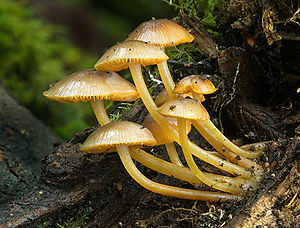
Back Micolochía AN علم الفطريات Arabic Micoloxía AST Mikologiya Azerbaijani Микология Bashkir Мікалогія Byelorussian Мікалёгія BE-X-OLD Микология Bulgarian ছত্রাকবিজ্ঞান Bengali/Bangla Foueoniezh Breton

| Part of a series on |
| Biology |
|---|
 |
Mycology is the branch of biology concerned with the study of fungi, including their taxonomy, genetics, biochemical properties, and use by humans.[1] Fungi can be a source of tinder, food, traditional medicine, as well as entheogens, poison, and infection. Yeasts are among the most heavily utilized members of the Kingdom Fungi, particularly in food manufacturing. [2]
Mycology branches into the field of phytopathology, the study of plant diseases. The two disciplines are closely related, because the vast majority of plant pathogens are fungi. A biologist specializing in mycology is called a mycologist.
- ^ Arora, Dilip K.; Khachatourians, George G. (2001). Khachatourians, George G.; Arora (eds.). Agriculture and Food Production (1st ed.). Amsterdam New York: Elsevier. ISBN 978-0-444-50657-3.
- ^ Sage, Harmony (2019). Yeast Fermentation Handbook: Essential Guide and Recipes for Beer and Bread Makers (1st ed.). Callisto Publishing LLC. ISBN 9781641526746.